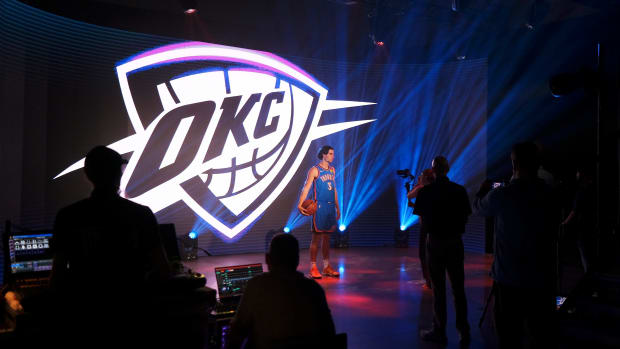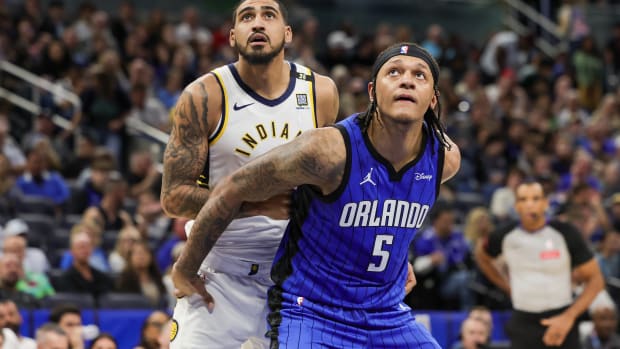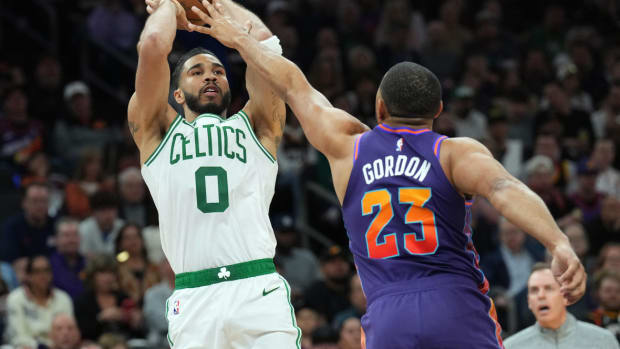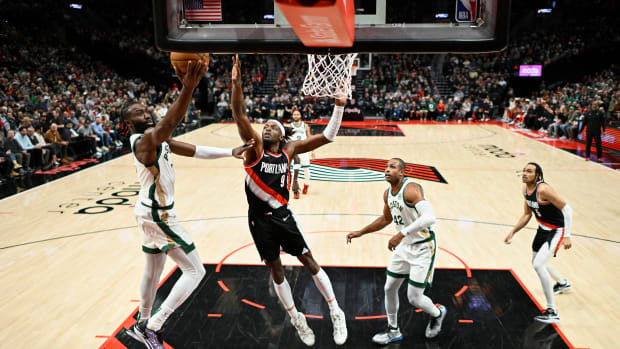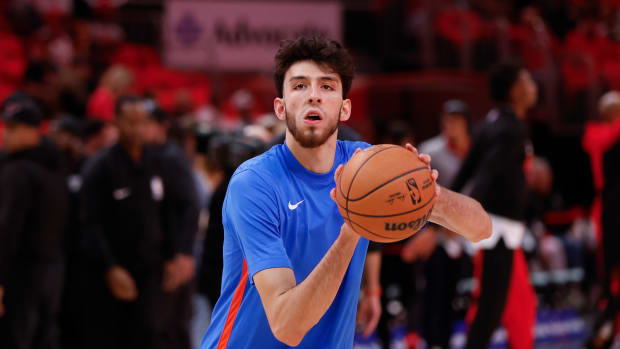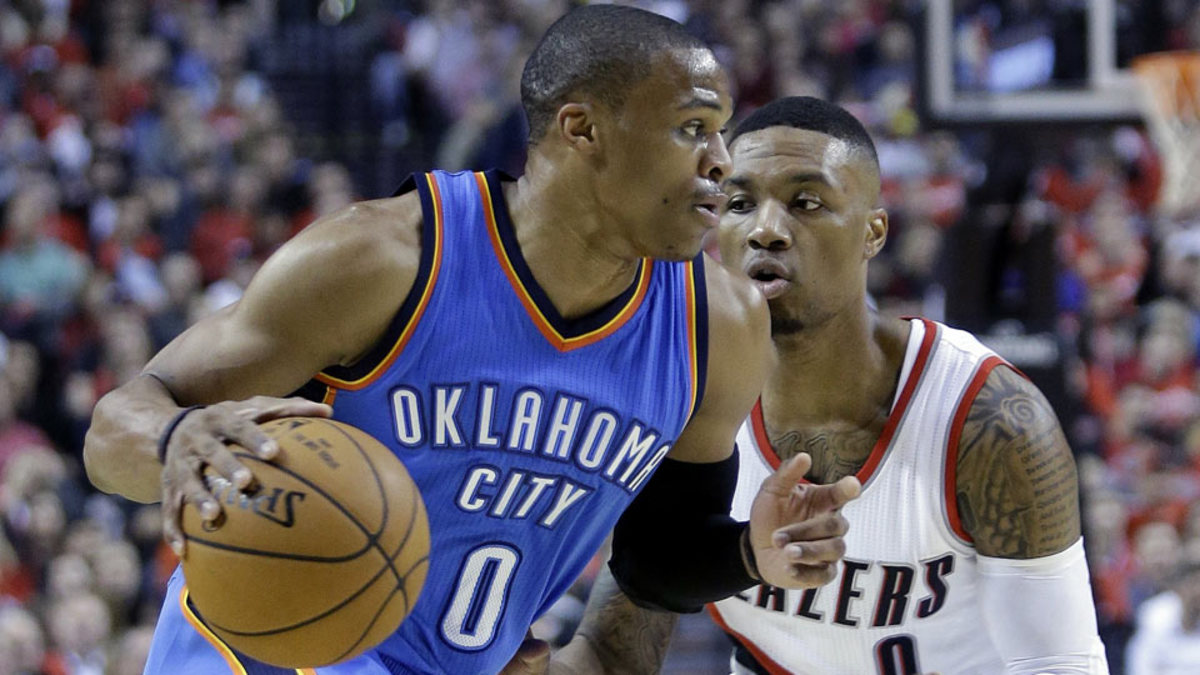
Thunder dive into the great unknown with Russell Westbrook at the helm
PORTLAND, Ore. -- The absence of Kevin Durant and the subsequent and mandatory rise of Russell Westbrook had a time-warping effect for the Thunder on Wednesday.
With Westbrook as centerpiece, Oklahoma City was often the best kind of blur in its season opener, fast and unpredictable in an aesthetically pleasing and exhausting way. Once Westbrook headed to the bench, though, slow motion took over: The offensive rhythm disappeared, the defensive intensity diminished, and the 15 minutes he rested felt like hours as backup Sebastian Telfair pounded the dribble and bricked jumper after jumper. The Trail Blazers pulled away in the final minutes to defeat the Thunder 106-89.
In less than 15 minutes, it became clear the Thunder will not be at the mercy of the shot-happy, out-of-control Westbrook caricature favored by his detractors. Rather, their main task, until Durant returns from right-foot surgery, will be to avoid getting blown out whenever their three-time All-Star point guard needs a breather. Oklahoma City's problem is not life with Westbrook as leader, but life without either of its franchise players on the court.
Bulls' Derrick Rose takes first step again in his return to greatness
That fact was underscored by the Thunder's many other injury absences: Durant was joined by Reggie Jackson, Jeremy Lamb, Anthony Morrow, Mitch McGary and Grant Jerrett, and coach Scott Brooks played all nine of his able bodies out of necessity. Oklahoma City led 77-75 entering the fourth quarter before being outscored 31-12, falling apart because of fatigue and a lack of secondary scoring threats.
After scoring seven points in the game's first three minutes by bullying Damian Lillard, Westbrook watched a six-point lead turn into a two-point deficit during his first-half rest. He reentered the game and immediately reversed the momentum: By halftime, he had tallied 26 points, five assists and two rebounds (and held Lillard scoreless) to build a five-point advantage. In the second half, Oklahoma City saw a one-point lead turn into a four-point deficit as Westbrook sat for more than six minutes over the end of the third quarter and the beginning of the fourth. As Westbrook observed, the Thunder managed just two points over four-plus minutes, and they were unable to keep up once the Blazers' launched a final, overwhelming offensive kick.
The see-saw tug that Westbrook exacted on the game flow crystallized Brooks' biggest challenge: deciding how hard to ride Westbrook. Remember, this is a player who has miraculously recovered his athleticism after three knee surgeries last year, a player who didn't miss a game for the first five seasons of his career despite heavy usage, and a player who handled 38.7 minutes a night as he played the best basketball of his career during the 2014 playoffs. Midway through the third quarter, Westbrook had outscored his teammates 36-35. The temptation to let him do his thing, however he wants to and without substitution, is very real and very strong.
While some Twitter critics argued that Brooks let a potential win slip away against the Blazers by leaving Westbrook on the bench for so long during the second half, it is clear that his handling of Westbrook was a matter of restraint and not forgetfulness. The Thunder are dead in the water if anything happens to Westbrook, they are set for a tough back-to-back against the Clippers on Thursday, and Westbrook arguably plays at a higher energy level, possession to possession, than anyone in the NBA. In this particular case, restraint should be applauded.
"It's not an easy decision to take him out," Brooks said. "You've got to be smart. It's a long season and a long game. He plays a lot. If he didn't play as hard, you could play him for 48 minutes. He plays so hard he needs some rest. Everyone needs rest, and Russell is no different."
70 reasons to watch the NBA this year
As is often the case when Westbrook is firing on all cylinders, it was tiring just watching him. He did damage offensively from all over the court. He started inside, backing down Lillard and putting Portland's All-Star point guard into foul trouble. He then found backdoor seams, cutting into high-percentage opportunities as Oklahoma City played out of the high post. His defense created offense, too, as he took off in the open court time and again, getting to the free-throw line 16 times and setting up a number of teammates for layups. There was very little recklessness; Westbrook used high screens from Serge Ibaka and Kendrick Perkins well, taking his favored mid-range pull-ups when they were available and finding his shooters when the defense tilted toward him.
"He's always attacking, he's physical, it's easy to get a foul called on you if you're physical back with him," Lillard said. "He can raise up over you and shoot, he can take you to the block. He's so explosive, he's so strong. He gave us all we can handle."
This was a full tour de force debut. Westbrook finished with a game-high 38 points (on 11-for-26 shooting), six assists, three rebounds, three steals and just two turnovers. For much of the evening, it looked as if his career high of 45 points was in jeopardy, and it's a safe bet he sets a new personal best at some point over the next six weeks.
The play of the night: Westbrook made up for a turnover at the end of the first half by turning a deep outlet pass into a dunk. Catching the ball one step past half court with 2.2 seconds left, Westbrook dribbled twice and slammed the ball home with 0.2 seconds remaining. He covered 40-plus feet and evaded three defenders in two seconds flat.
More important than the stats or the highlight-reel fare was his overall influence: Even with both Lillard and LaMarcusAldridge on the other side, the action revolved around him for the first three quarters. Only after Portland small forward Nicolas Batum switched onto him in the final period did Westbrook's impact wane. The combination of the Frenchman's length and the toll of carrying an offense finally seemed to wear down Westbrook.
Roundtable: Five biggest questions entering the 2014-15 NBA season
"It's going to be a feeling-out process for all of us," Westbrook said of life without Durant, adding that he felt his play was merely "not bad" in the opener. "We've got guys playing out of position. We've got three-guard [lineups] and a lot of different things going on. We've got to fight through it all and play our game."
Still, those hyping Westbrook as a possible MVP candidate had every reason to feel their opinion was validated in the opener. His two-way play was commanding enough to suggest that this could be the season Westbrook challenges Chris Paul's long-held "best point guard in the NBA" title.
"Westbrook is strong, fast, and he can jump and dunk on anybody," Batum said. "LeBron [James] can do that. Paul George can do that. [Durant] can do that. But [Westbrook] is a point guard. That's the difference. He's the only point guard who can do that."
Batum added that Westbrook, by virtue of attacking from the top of the key, can be even more difficult to check than the league's elite wing scorers.
"Point guards are faster," Batum said, "and when you've got a wing, you're coming off pin-downs and running off screens. With a point guard, you have the play on top and you don't know what's happening behind you. When I guard a guy like Paul George, I'm able to see everything. With a point guard, I don't know what's going on behind me. It's different."
That terrifying feeling of "Here he comes, now where is he going?" repeats even more often now that Durant is out. It shouldn't take long for viewers to fully embrace the anxiety that can accompany Westbrook's mad dashes and increased authority. Indeed, the punchless alternative that presents itself whenever he rests will help ensure that. As for the Thunder, they seem fully comfortable racing into this Westbrook-centric temporary reality with the same fervor that their point guard chews up the hardwood during a fast break.
"Russell plays every possession like it's his last," Brooks said. "That's what I love about him. ... He's our leader on the court until Kevin comes back. I have no complaints about how Russell played. He's an emotional, competitive basketball player. That's what we need."






























